The National Task Force on Election Crises was the brainchild of a small "cross-partisan" group of people who began to meet in February of 2019. The group met regularly for two years and was "motivated by a shared concern over the unique risks to a free and fair election in 2020." Ben Raderstorf, who leads Protect Democracy's IdeaHub team, was in charge of coordinating the group and its nascent election crisis task force. The task force continues to operate today, as evidenced by the August 11 readout on "election threats" from Assistant Attorney General Kenneth A. Polite.
It is important to protect the security of our elections, no doubt. However, a review of the activities of this group and the belief system that seems to underlie its mission shows a concerning bias that could lead to the targeting of citizens whose only aim may be to ensure elections are fair and free of fraudulent activity. The task force released its first formal report on January 15, 2021. Another updated report followed on July 14, 2021.
Protect Democracy: An Election Task Force is Born
Shortly after the events of January 6, Raderstorf speaks in his briefing video about the formation of the task force. He describes its genesis from a small group of concerned people to its eventual transition to The National Task Force on Election Crises. The task force has become a high-level government-sponsored entity with members like David Becker with CEIR, Secretary of the U.S. Department of Homeland Security Michael Chertoff, and CTCL's Tiana Epps-Johnson at its helm. Eventually, the task force would have at its disposal the full force and power of the DOJ and the FBI to "deter, detect and protect against threats of violence against election officials." A June 25, 2021 memo from Deputy Attorney General Lisa Monaco telegraphs the formation of a related DOJ task force comprised of members from the Criminal Division, the Civil Rights Division, the National Security Division, and the FBI to protect "against threats against election workers."
Protect Democracy's Missions and Initiatives
The Protect Democracy organization is behind many initiatives related either directly or indirectly to elections with an alarming measure of bias against Trump and any ally or issue associated with him. Initially, their self-assigned mission was to "ensure a peaceful transition or transfer of power" after the election. To that end, one of their first orders of business was the call to remove Donald J. Trump from office. Many of the "illegal actions" listed below by the task force can be understood by some as thinly veiled, politically-biased hits against the Trump administration's alleged actions before leaving office to protect the election and his outgoing administration.
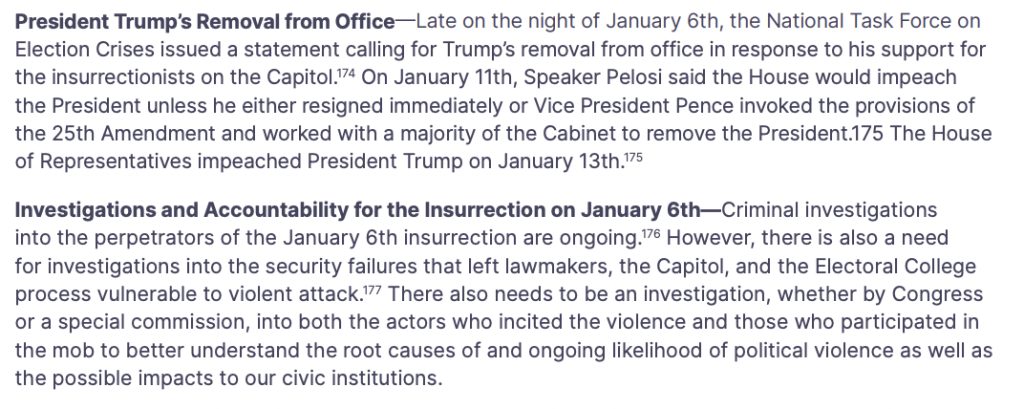 The National Task Force on Election Crises
The National Task Force on Election Crises
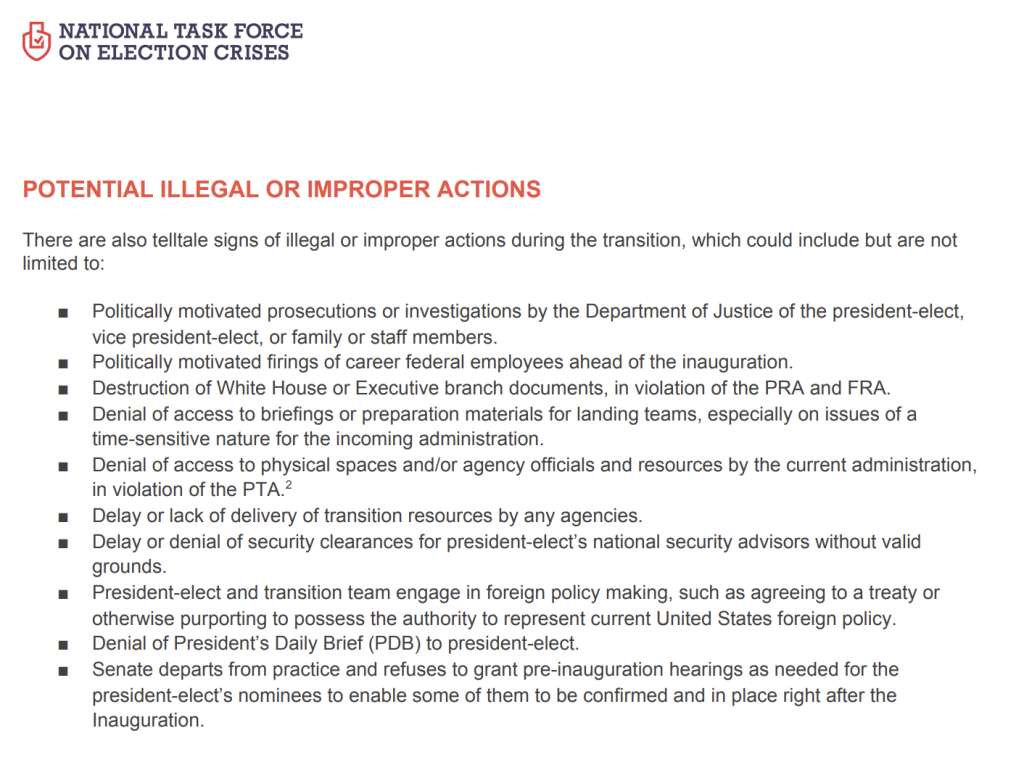 Transition Period Dangers
Transition Period Dangers
An extensive list of Protect Democracy activities shows a much deeper level of interest in "the threats to democracy." Their projects are wide-ranging and are all, in one way or another, inextricably linked to the task force itself. Their pursuits range from lawsuits to ensure "accountability in court for the January 6 insurrection" to their electoral count reform act project and its supporting January 10, 2022, white paper on how "America's electoral system benefits authoritarianism." Many of their projects center around fighting issues related to Trump's election claims. There are FOIAs on Trump's alleged NSA interference into "Russia's meddling in our election" that represent but one of many Trump-related projects.
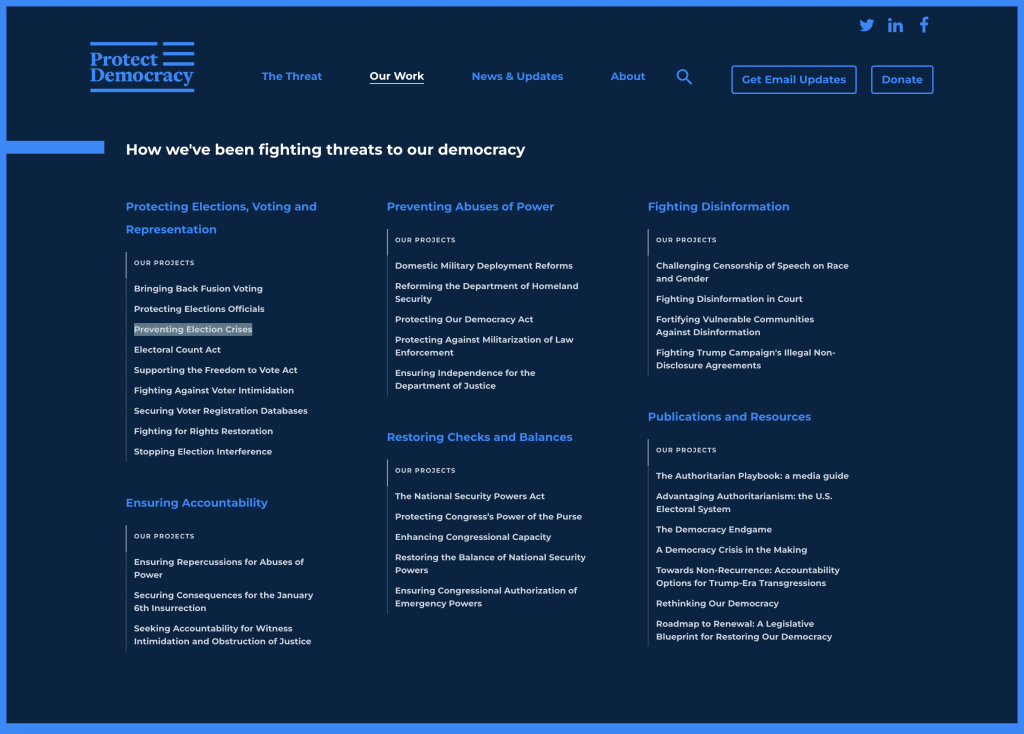 Protect Democracy Projects
Protect Democracy Projects
The Media Handbook on Authoritarianism
Much of the language in Protect Democracy's documents centers around an alleged "rightwing," authoritarian threat to democracy. And, of course, is frequently seen in this administration; the organization focuses on the threat of disinformation with handbooks written expressly for the media to help them "distinguish between threats from politics as usual." The Overview Page of the document talks about the media's "unbiased but not neutral role in a healthy democracy":
"This briefing is designed to help the fourth estate advance this 'unbiased but not neutral' role in a healthy democracy by providing two contextualizing resources: a common playbook of tactics used by would-be autocrats in the U.S. and around the globe and a framework for distinguishing between these authoritarian tactics and normal political jockeying."
[gallery type="slideshow" size="large" td_select_gallery_slide="slide" ids="42760,42762,42761,42763"]
Ironically, as these projects speak about marginalizing particular communities and censoring free speech, much of their ideation and activity centers around doing just those things to the communities with whom they disagree. The difference is that they have the levers of governmental power to influence elections and target everyday Americans.
Two Task Force Reports: January and July 2021
How do we avoid another election like 2020? The National Election Task Force has the answers. Early voting and mail-in-voting, often the key vectors for fraud in elections, are first on the list. Some of the suggestions are chilling infringements on free speech, which has become all too common on social media platforms. And, apparently, "civil society must prepare for the worst, again":
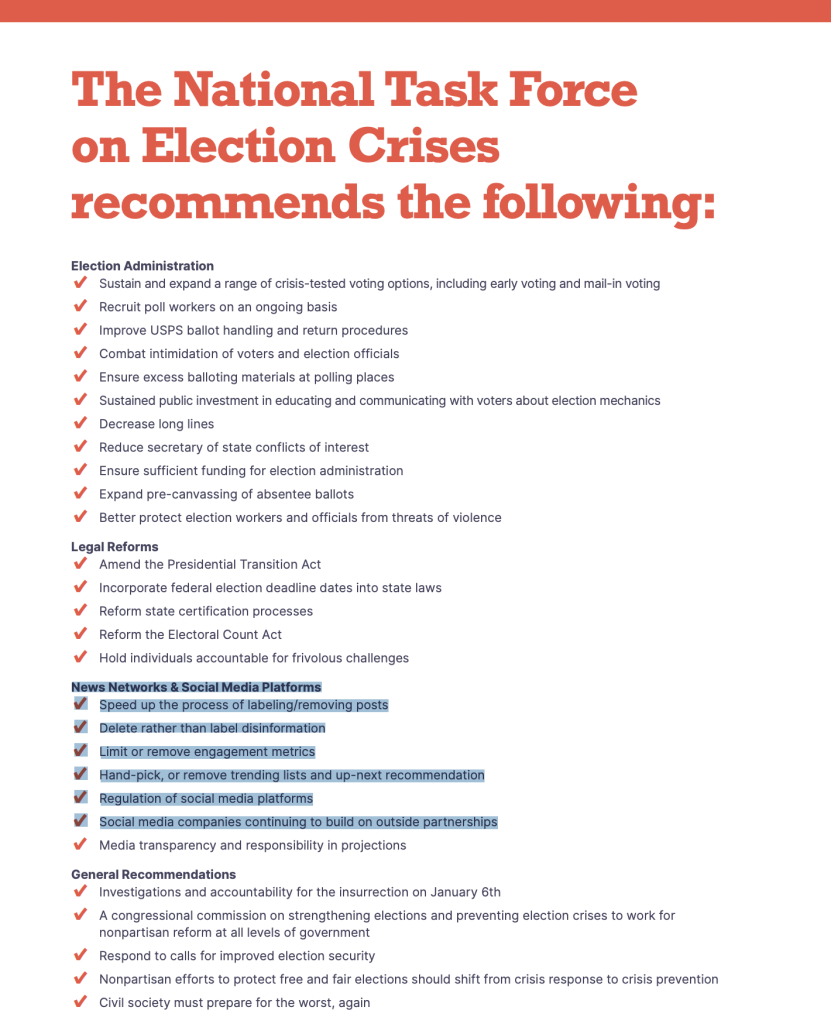 National Task Force Recommendations
National Task Force Recommendations
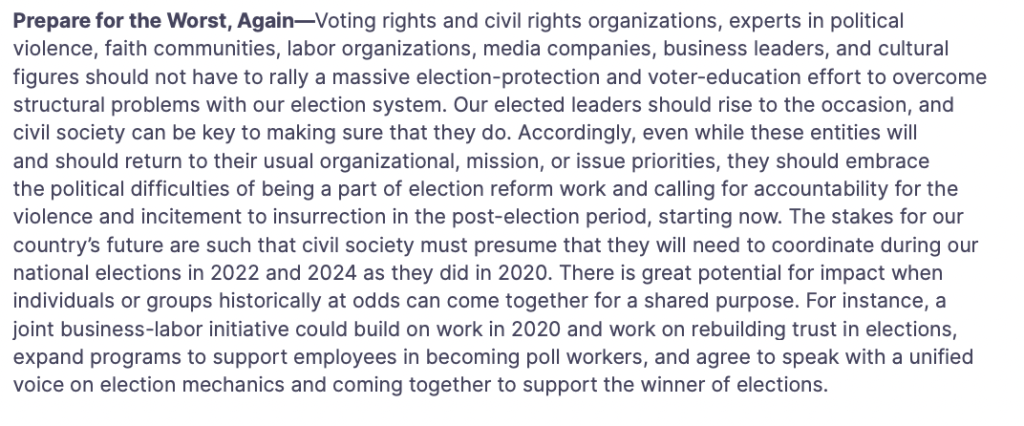 Prepare for the worst in 2022 and 2024
Prepare for the worst in 2022 and 2024
There are repeated references in the January report to the disenfranchisement of voters because of attempts to "undermine the results of the election." In other words, the task force does not want Americans to investigate or challenge elections.
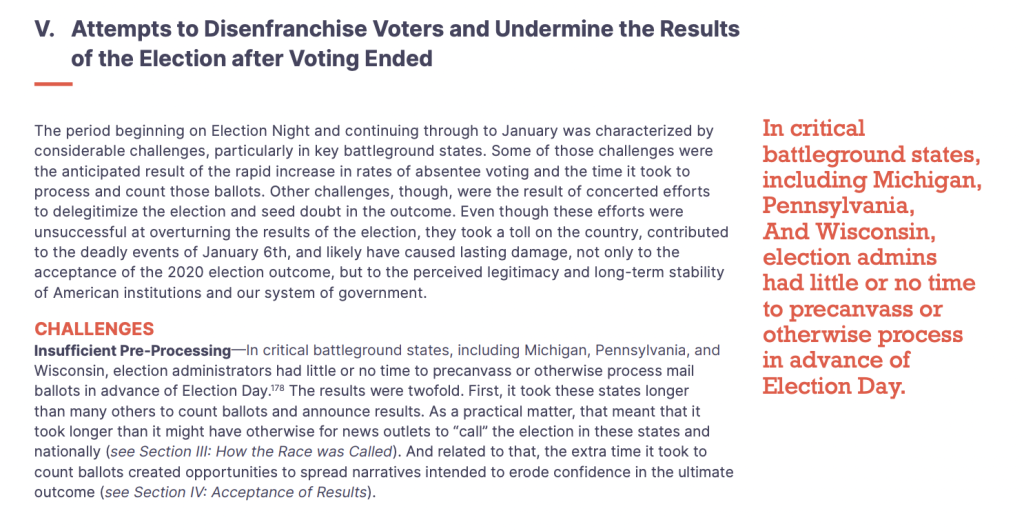 The National Task Force on Election Crises Report January 2021
The National Task Force on Election Crises Report January 2021
With their updated report, let's see what the task force was up to in July of 2021. Well, they are concerned about legislatures that propose laws that "might allow them to directly overturn election results they disagree with in the future" when, in fact, those referenced laws reflect legislative action to name electors in the case of fraud in an election. (see Page 3). And, of course, everyone knows that "rightwing extremists, in particular, have 'terrorized' election workers."
 National Task Force on Election Crises July 2021
National Task Force on Election Crises July 2021
Are You a Threat to Democracy?
Remember, despite all this worry over threats to our elections, the November 3 election was still the most secure in history—if CISA is to be believed. Nevertheless, Merrick Garland and the National Task Force on Election Crises plan to protect election workers from "threats and intimidation." The fluid, relativistic nature of definitions in today's culture makes it tough to know what this administration really means when it utters the words "threats" and "intimidation." In an environment where election integrity investigations are described as "undermining democracy," it is not difficult to make the leap that a citizen who reports an irregularity could be targeted as a threat and a "domestic terrorist." The transparently biased nature of this task force and many actions set forth in the current administration—including the unprecedented January 6 witch hunt where citizens are still being held in a D.C. jail—make it very difficult to believe that this task force has our best interests at heart. I hope it is not true, but there is sure a lot of evidence to warrant sincere concern.


